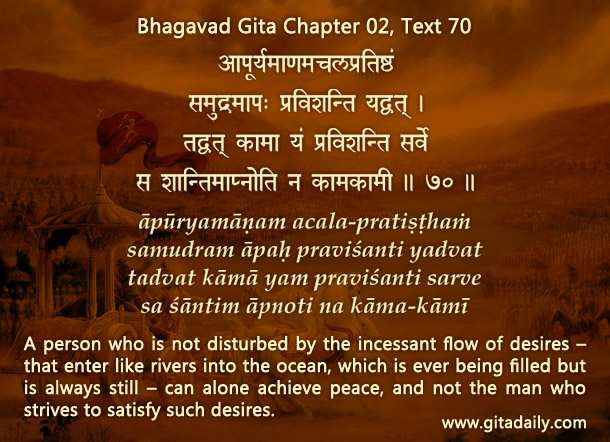We sometimes experience mood swings, whereby small good things make us elated and more commonly small bad things make us dejected. If such mood swings become frequent or extreme, others can’t count on us; in fact, even we can’t count on us.
How can we avoid such emotional extremes? By relocating our emotional center. We can’t always change the outer conditions that trigger our emotions; we can’t even change quickly the inner conditionings that make us prone to certain emotions.
Nonetheless, Gita wisdom explains that we are at our core spiritual beings who transcend our conditions and conditionings. Understanding this intellectually, we can strive to relocate the center of our emotions — our consciousness — from worldly things to the source of all things: Krishna.
The default location of our consciousness is determined by our primary attachments. Not only that, the size of our attachments shapes the size of our consciousness. When we are attached to small things — things of this world that last for a short while, compared to the eternality of our souls — our consciousness becomes like a puddle. And worldly upheavals are like rivers that rush into the puddle, flooding it and disrupting everything around it. But when we are attached to big things — especially the biggest reality, Krishna, who is eternally omnipotent — our consciousness becomes like an ocean. River-like upheavals don’t disrupt an oceanic consciousness (Bhagavad-gita 02.70).
How can we relocate our consciousness from the world to Krishna? By practicing bhakti-yoga regularly and especially by sticking to those limbs of bhakti that we feel naturally attracted to. When we thus ground ourselves in the eternal, we will become decreasingly prone to emotional extremes caused by ever-changing externals.
Think it over:
- When dealing with emotional extremes, what can’t and can be changed?
- How does changing the center of our emotions matter?
- Where are your emotions presently centered? How can you spiritualize that center?
***
02.70. A person who is not disturbed by the incessant flow of desires – that enter like rivers into the ocean, which is ever being filled but is always still – can alone achieve peace, and not the man who strives to satisfy such desires.
To know more about this verse, please click on the image
Explanation of article:
Podcast:


Hare Krishna.Excellent. Felt peace after reading.
Happy to be of service.
I’ve never commented before, but I wanted to let you know how important these reflections are in my daily life. I’m newly exploring this path, and day when I see my notification from you, I’m reminded to return. Thank you.
Thanks, Chris, for your comment. Grateful and delighted to know that my writings have been of service to you. All the best for your spiritual journey.